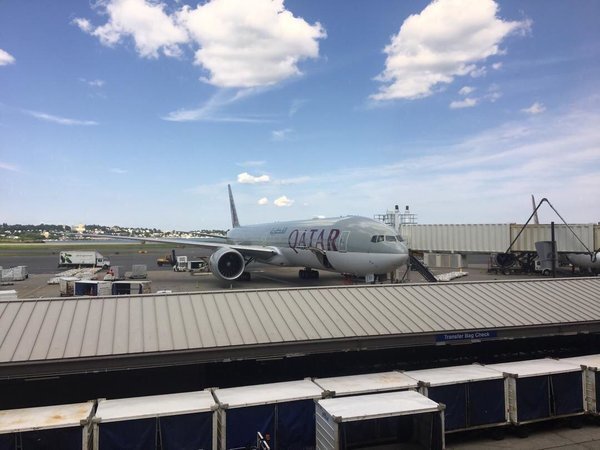Iranian students recall being humiliated at U.S. airports

TEHRAN — At least 16 Iranian students have been turned away at U.S. airports due to escalating tensions between Tehran and Washington in recent weeks.
The New York Times said many of the students had secured admission to some of the world’s most prestigious universities.
According to the paper, the U.S. State Department approved them for entry into the United States after a notoriously grueling, months-long vetting process and issued them visas to come to the United States.
But when the students reached American airports, Customs and Border Protection officers disagreed and sent them home, some with a five-year ban on reapplying to return to the United States.
Most of them said they were not told why they were deemed “inadmissible” — a broad label that customs officers have wide discretion to apply.
Mohammad, 30, was studying at Northeastern University. He was turned away at Boston’s Logan International Airport on October 6.
After Mohammad was told that his visa was going to be revoked, the officers took a picture of him, for their records. Then, he says, they laughed. “I looked as despondent in the photo as I felt and they found it very funny. I felt demeaned and humiliated,” he said.
Amin, 34, entering a Ph.D. program at the University of Florida, was turned away January 1 at Hartsfield-Jackson Airport in Atlanta.
When they told him he had been deemed inadmissible and would be returned to Iran, he collapsed onto a chair, crying.
A flight back to Iran was not available for a couple of days, so Amin said he was placed in a chilly holding cell for six hours, then transported in cuffs and chains to an immigration detention facility in Georgia. The officers there ordered him to strip naked in front of them.
“The moment I entered the cell, I lost my spirit,” he said. Now back in Iran, he has lost $6,000 — the equivalent of two years’ work — on his travel and applications. The company he worked for has filled his old position. Having moved out of his apartment in Tehran, he is bouncing from one relative’s home to another.
Hamid, 22, entering a combined master’s and Ph.D. program in engineering at University of Notre Dame, was sent back January 11 from Chicago’s O’Hare International Airport.
When he arrived in Chicago, he was placed in a holding cell for 19 hours.
Officers asked him for his opinion on political events in Iran and whether he thought Iran was doing “the right thing.” He was asked what he thought about the Ukrainian jet that had been shot down three days earlier by two Iranian missiles. Hamid told the officer he had a friend who died on the plane.
Hamid said he and two other detained travelers were given foam mattresses and thin blankets, and he hardly slept.
“After 24 hours, I was transferred to the boarding gate in the company of two armed officers, as if I was some kind of terrorist. It was both humiliating and dehumanizing,” he said.
He phoned his parents when he reached Istanbul, en route back to Tehran. “There were so much pain in my parents’ voice,” he said.
Reihana Emami, 35, planned to attend Harvard Divinity School. She was turned away on September 18 at Logan airport.
The officers’ questions were simple at first, Reihana said: “Where did you work?” “Who are your relatives?” But then the conversation turned to unfamiliar territory.
During the nine hours she was questioned, she said, she asked if she could rest, because she had been traveling for 18 hours. But the officer told her that lots of travelers had done the same, and a Harvard student “should be clever enough to handle” it.
“Now I am jobless,” she said, adding that she and her family were still struggling to believe what happened. “It was like a shock and trauma for everybody.”
Pegah, 28, was preparing to study for a master’s degree in business administration at Southern New Hampshire University. She was returned home on August 1 from Logan airport.
After waiting 15 months for her visa to be issued, Pegah flew from Shiraz, Iran, to Boston. “When I entered the airport the bad treatment started,” she said.
At one point, Pegah asked an officer if she could have a snack.
“He threw a candy at me with terrible manners, like I was a dog,” Pegah said, “He shouted at me, ‘Take it! I told you to take it!’”
Mahla Shahkhajeh, 26, was accepted into a Ph.D. program in industrial engineering at Iowa State University, but was turned away on December 22 at Logan airport.
She had already left her apartment and quit her job in Tehran. “All of my efforts and all the money I spent became nothing.”
Behzad, 32, who planned to study material sciences at Worcester Polytechnic Institute in Massachusetts, was turned back August 19 at Logan Airport.
“The room was an exact replica of what you see in Hollywood movies,” he said. “It was very bright and small. I had to sit in a chair, with no table. A guy behind a computer started to interrogate me.” Behzad said he went through multiple rounds of questioning for about eight hours, and had not slept in nearly two days. “I was in too much shock to even ask for water,” he said.
Mohammad Elmi, 31, was to begin a Ph.D. program at University of California, Santa Barbara. He was denied entry on December 13 at Los Angeles International Airport.
Arash, 30, accepted into a Ph.D. program in electrical engineering at the University of Massachusetts, was sent back along with his wife, Saba, 30, on January 13 at Logan airport.
MH/PA
